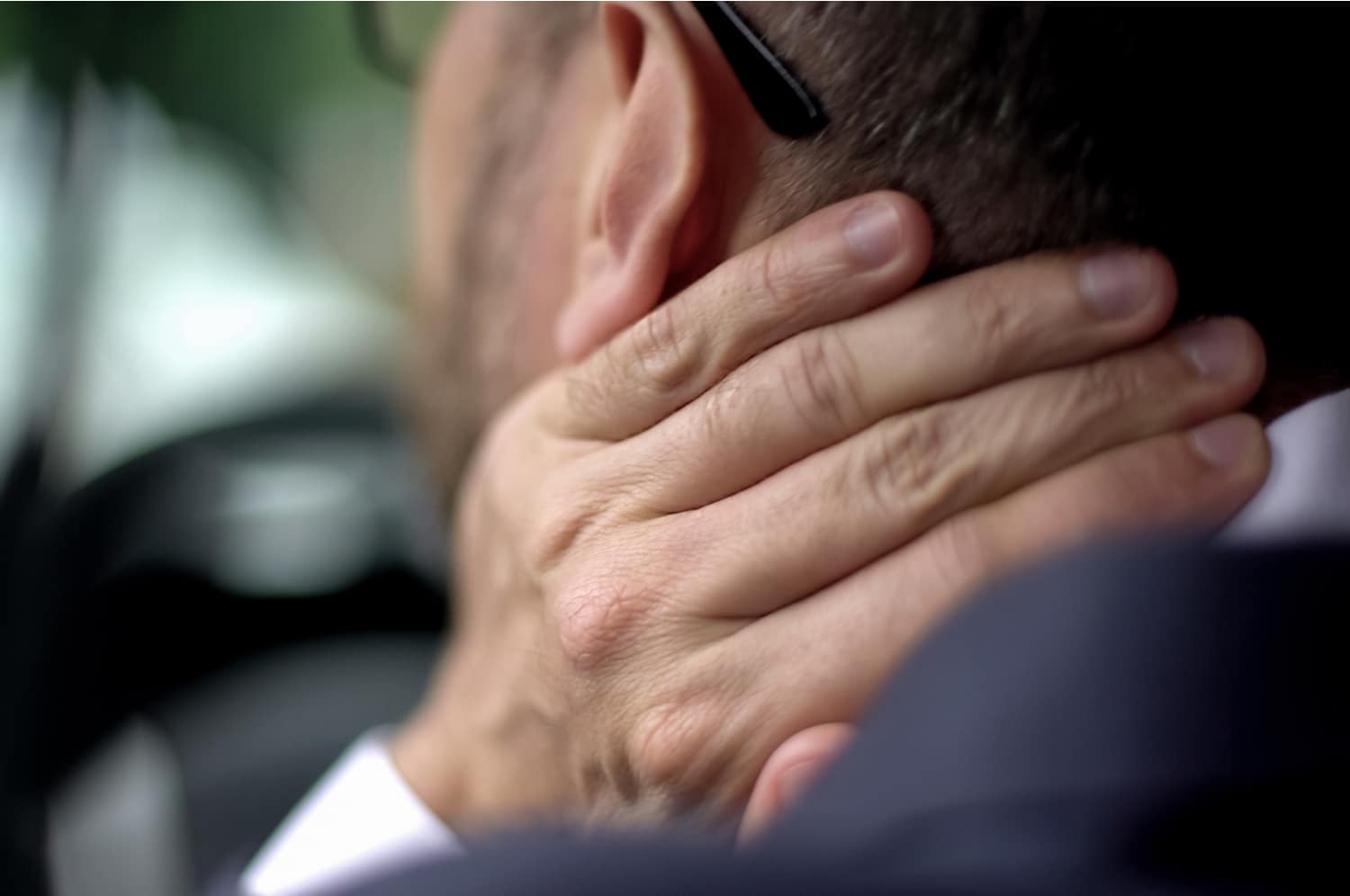Post-traumatic headaches after a car accident usually resolve after a few months. However, a surprising number of crash victims experience chronic headaches for years after their wreck. Unfortunately, insurance companies are skeptical of people who claim ongoing, disabling headaches—and sometimes deny legitimate claims.
In this article, the traumatic brain injury (TBI) lawyers at Crosley Law discuss post-traumatic headaches, common causes, and how you can regain control when a serious car crash causes head pain that won’t go away.
RELATED VIDEO: FAQs Headaches After Head Injuries
What Is Causing My Post-Crash Headache?
It’s not easy to identify the exact cause of post-collision headache. Unlike some conditions, you can’t always pinpoint a headache’s cause with diagnostic tests like MRIs and CT scans. Depending on your situation, your doctor may link your headache to a variety of factors.
Traumatic Brain Injuries (TBI)
Head pain can have many causes, but you should always be concerned about a traumatic brain injury after a car crash. Traumatic brain injury is an umbrella term that covers a variety of different types of head injuries, ranging from the relatively minor to catastrophic. Common head injuries include:
- Concussions: One of the most common types of TBIs, a concussion occurs when your brain sustains microscopic damage to its blood vessels and nerves. While some people recover quickly from a concussion, many live with post-concussion syndrome for months or years.
- Contusions: A crash can cause bruising on the brain at multiple locations, as the brain repeatedly slams against your skull during an impact.
- Intracranial Hematomas: Intracranial hematoma involves ruptured brain vessels that are bleeding into your skull or brain. This bleeding is potentially life-threatening as it can cause pressure on the brain.
- Diffuse Axonal Injuries (DAI): Axons are nerve fibers that communicate messages from the brain. As the brain strikes your skull, the forces can stretch and rip your axons.
Any of these conditions may cause headaches. In fact, 90% of people with mild TBIs, like concussions, experience post-traumatic headaches. Other symptoms of a TBI include vision issues, dizziness, memory loss, mood changes, and disorientation. If you’re experiencing any of these symptoms, seek medical care right away.
RELATED: Identifying An Undiagnosed Traumatic Brain Injury
Whiplash
Whiplash occurs when the neck jerks back or forward abruptly, damaging your neck’s soft tissues and nerves. Whiplash can result in lasting pain in the neck, shoulders, or back, and cause post-crash headaches.
You may have whiplash headaches if:
- You were in a rear-end collision.
- The headache starts at the base of your skull (by your neck).
- The headache appears within a couple of hours to days of the car crash and gradually worsens.
- Looking up and other neck movements trigger or worsen your headache.
Stress
Car crashes and their aftermath are undeniably stressful. Besides causing memory and sleep issues, stress can also result in persistent headaches. Although stress headaches are not typically life-threatening, they can be debilitating.
You may have headaches if:
- You feel stressed, anxious, or jittery.
- You experience a feeling of pressure across your forehead, sides, or back of your head.
- Your scalp feels tender.
- You do not experience visual disturbances or light sensitivity (typical signs of a migraine).
Reaction to Medications
Many medications list headaches as a potential side effect. If your doctor prescribes you medication for physical or emotional symptoms from the car crash, it could be causing your persistent headaches. Combining multiple medications—or even caffeine or alcohol use—with a medication can also cause headaches.
“When you’re experiencing a severe headache, contact your doctor or headache specialist. They may be able to help alleviate your symptoms, run tests, and track your headache’s progression.”
You may have medication-related headaches if:
- Your headaches appear or worsen when you consume caffeine or alcohol.
- You’re taking higher doses of medication than your doctor prescribed.
- You did not tell your doctor about another medication or recreational drug you use.
- The headaches began within a few days to a few weeks of starting a new medication.
If you’re concerned about medication-induced headache, speak to the prescribing doctor about alternative therapies.
What Should I Do if the Insurance Company Won’t Cover My Headaches?
Insurance companies are continually looking for reasons to deny injury claims. When your headaches don’t resolve quickly or aren’t easily explained, it may use this as an excuse to deny your compensation. The adjuster may even argue that you’re exaggerating your symptoms or faking your injury.
To fight back, you’ll need strong medical evidence that documents your headaches and links them to the crash. When you’re experiencing a severe headache, contact your doctor or headache specialist. They may be able to help alleviate your symptoms, run tests, and track your headache’s progression.
RELATED: FAQs: Headaches After Head Injuries
However, you’ll also need help from a lawyer who understands the nuances of crash-related headaches and has a track record of success with complicated claims. Tom Crosley’s team of TBI lawyers carefully evaluates our clients’ medical records and crash reports, looking for information that strengthens and explains their disabling headaches. We understand that every survivor’s situation is different and treat them with the respect and care that they deserve.
Call the Experienced Head Injury Attorneys at Crosley Law
At Crosley Law, we always urge our clients to see a doctor if they are experiencing post-crash headaches. The at-fault driver may also be responsible for your medical bills and other damages.
Our attorneys have years of experience helping victims of TBIs and other injuries sustained from car crashes and are here to help. If you’ve been in a car crash and are experiencing headaches or other symptoms, contact our attorneys. Call us today at 210-LAW-3000 | 210-529-3000 or complete this brief online contact form to schedule your free consultation to discuss your rights and options.
References
Evans, R. (n.d.). Mild closed head injury and headache. American Migraine Foundation. Retrieved from https://americanmigrainefoundation.org/resource-library/mild-closed-head-injury-headache/
Post-traumatic headache. (n.d.) American Migraine Foundation. Retrieved from https://americanmigrainefoundation.org/resource-library/post-traumatic-headache/
Tull, M. (7 October, 2019). The link between PTSD and headaches. Very Well Mind. Retrieved from https://www.verywellmind.com/the-association-between-ptsd-and-headaches-2797467
Medicines that can cause headaches. (16 May, 2019). WebMD – Migraines & Headaches. Retrieved from https://www.webmd.com/migraines-headaches/medication-headaches#1
The content provided here is for informational purposes only and should not be construed as legal advice on any subject.









